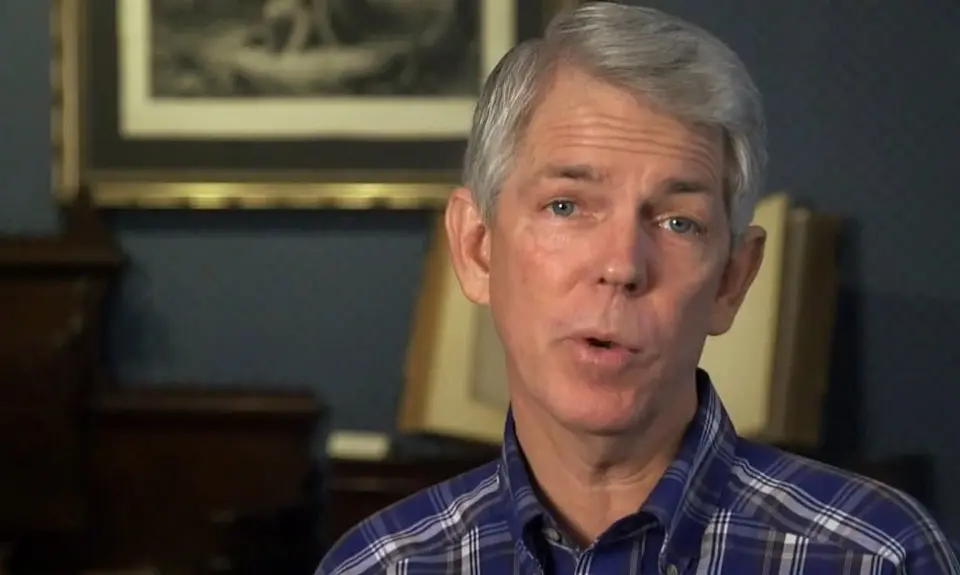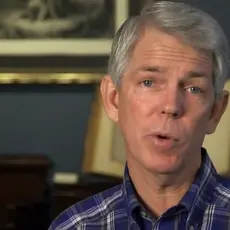Religious-right “historian” and Republican political activist David Barton said last week that governors have shut down the country out of fear and panic because America has become so secularized that people fear death because they don’t have confidence that death will bring them an eternity in Heaven. Barton is an influential conservative activist who has helped write recent Republican Party platforms.
Barton made his comments during an appearance last week on “Stand in the Gap,” a radio program produced by the American Pastors Network. During the show Barton, true to form, mangled historical facts and used actual facts to promote dubious narratives.
Barton began by listing a series of epidemics and pandemics that have taken place on American soil, beginning with a smallpox epidemic during the colonial period. Barton said that COVID-19 has killed about 1 out of every 100,000 Americans* (he referred to “over 30,000” U.S, deaths caused by the coronavirus, though as of this writing the number is approaching 60,000.) Barton contrasted that death rate with the smallpox epidemic of 1633, when, he said, “the mortality rate was over 70 percent.” So, he said, “the fear factor was much, much, much greater back then.”
But people suffering in 1633 didn’t panic, Barton said, because of their belief in God:
But the difference was they were much more grounded with God. As you look across Massachusetts, as you look across the New England areas, so many of those guys had come here on the Bible, on religious liberty. And for them death was, that was a step into eternal life. Today, this is the most secular America has ever been. And so, we're watching governors and mayors respond out of fear and panic, and shutting down stuff that's never been shut down before because they're just scared to death somebody's going to die. And so, the confidence of courage is really what we don't see right now nationally.
“Stand in the Gap” host Sam Rohrer emphasized Barton’s point:
But a point you made there, I think is worth touching on. And that is the worldview of people at that time caused them not to panic or to fear because of the fear of death. Because they knew, as we know as believers, that if we are to pass away, we're only going to step from here into eternity with the Lord. And that's what we want to do. But for those who do not know the Lord, or have rejected a biblical worldview understanding of God and redemption, they frankly have a reason to fear at these days.
…
Wow. They had reason to fear back there, but they did not because of belief in God.
Barton’s “history” has frequently been challenged by legitimate historians. His Christian publisher pulled his book about Thomas Jefferson after scholars—including conservative Christians—challenged its accuracy. So, it seemed wise to examine Barton’s claims.
Unlike Barton, I do not claim to be a historian. But just a bit of online research from trusted sources reveals that the smallpox epidemic of 1633 that Barton refers to did not in fact take a huge toll among the English colonists, but it did kill vast numbers of Native Americans, wiping out entire tribes and more than 70 percent of the indigenous population in New England. That’s devastating, to be sure, but it’s not at all clear how that fits Barton’s construction of a narrative comparing God-fearing colonists to death-fearing modern secularists. Indeed, some European settlers actually believed that it was a sign of divine favor that God inflicted on the indigenous people with whom the settlers were involved in land disputes. Prominent clergyman Increase Mather later wrote about the toll diseases took on American Indians as “the sword of the Lord.”
Barton returned to his theme that U.S. policy during the pandemic has been influenced by the increasing number of non-Christian Americans. He said early American biographers always described how people died, because if a person “showed fear and panic looking into eternity” it was a sign that they weren’t a Christian, because a Christian “wouldn’t have had a fear of death.” Barton continued:
So, what we see right now is a fear of death. And we're seeing people go to excessive extremes because they are scared to death of dying, because this is all they know, is what's here. They don't know of an afterlife, they don't even understand that there will be an afterlife, whether it's Heaven, Hell, or whatever they choose. It's their choice through Christ. So that's one thing that stands out to me is, is the whole culture was built around understanding that you are going to go into eternity. Are you ready to go into eternity? And so, the response is quite different public policy wise. If you're surrounded with leaders who understand a biblical worldview, what you do is call for days of prayer and fasting, if we can get a hold of God on this and get God to intervene then we can see an end to this.
Barton also talked about the governmental response to the Spanish Flu pandemic of 1918, in which 675,000 Americans died. Barton said that then-President Woodrow Wilson “never even mentioned” the epidemic. Barton asserts that “there was absolutely no response from President Woodrow Wilson, because we understood federalism.” And federalism means that “the federal government’s not in charge of health care. That’s a state and that’s a local issue. And so, this was dealt with state by state and city by city.”
Barton is correct that Wilson was quiet about the pandemic, but that doesn’t mean it was about federalism. It was a disastrous consequence of his focus on achieving military victory in World War I and the media’s complicity in downplaying news of the pandemic in favor of cheering on the war effort. Barton’s assertion that Wilson’s silence was somehow a reflection of a shared national commitment to federalism seems laughable when you recall that Wilson is despised by self-declared “constitutional conservatives” as a proponent of big-government progressivism. Barton himself has included Calvin Coolidge in his top five U.S. presidents because “he did so much to reverse Woodrow Wilson.”
Barton said that during the 1918 epidemic, churches initially cooperated with cities’ public health orders. “Then as the numbers started flattening out toward the end, the churches said, ‘Look, the numbers are flattening. We're going to go back to worship, we're going to go back to service. We’re going to get back to God,’” he said, adding, “I think that's kind of where we are now.”
Barton also said that in 1918, “there was never really a government full shutdown of work,” adding that governments curtailed working hours “but they did not destroy the economy.”
“And so this is a new one with this fear and panic,” Barton said. “The government interventionists jumped in.”
Barton once again suggested that the level of government intervention in response to the COVID-19 pandemic is connected to secularism and a lack of biblical literacy:
This is the most government we've ever seen in any pandemic in this sense. So, this is the most government intervention. There was a lot in 2009 with the swine flu, but again, America is becoming more secular at that point in time. We also understood less about the Constitution then. Our constitutional knowledge today and our biblical knowledge [are] both at the lowest that they have been in recorded history. So, with a low constitutional knowledge and a low biblical knowledge, the fear factor is high, the panic factor is high, and the constitutional factor is low. You throw those two things together. This is the greatest government intervention we have seen historically. And again, the question is, Will it make a difference? Probably not.
Barton also said that government actions to shut down businesses reflected a lack of commitment to what he said was the founding fathers’ belief in “an inalienable right to provide for our family, to provide an income, and therefore, government did not interfere with jobs, did not interfere with personal incomes, because that's a God-given responsibility and a God-given right.”
Barton was appalled by New York Gov. Andrew Cuomo’s recent comments that it was collective public health action, not God, that had begun to slow the spread of the virus in New York. “Oh my gosh, we would never have thought of saying that in a previous generation,” Barton said. Rohrer compared Cuomo’s remarks to kings referenced in Psalms 2 inviting God’s wrath by shaking their fists at God.
Rohrer closed the segment by saying that while the God who “took our nation’s citizens and Christians through those difficult circumstances is the same one today,” the country is not the same. “We have a lot of people who do not have a fear of God. We've rejected God as a nation. We've done things to actually upend God's moral law. And as a result of it, we have a lot more people fearing that which is natural.”
*Update and clarification: Thanks to an alert reader who asked us to check Barton's math. Thirty thousand deaths out of 330 million Americans—both figures cited by Barton—is approximately one in 10,000, not one in 100,000. Complicating the picture is that Barton’s first reference to his calculation of the death rate limited it to a certain number of states—presumably those with smaller caseloads—but in the same sentence referred to death rates “in America.” Just to make it messier, Barton initially misstated his own assertion as one out of 1,000 before changing it to one out of 100,000. Later in the broadcast he said "right now, we're one out of 100,000" without limiting his assertion to a subset of states.
For transparency’s sake, here is a transcript of relevant portions of the broadcast:
Barton: “By the way, the death rate right now, in 39 of the 50 states, the mortality rate is 11 persons per million, or about one out of 1,000 are dying in America. So, we have a fairly small percentage that are dying, although we’re now up around over 30,000 deaths, percentage-wise it is small. We have 330 million in America. In 1633, the mortality rate was over 70 percent for the smallpox epidemic. So, seven out of 10, not one out of 1,000—excuse me, not one out of 100,000, which is 11 parts per million. We're talking 70 out of 100, or seven out of 10. So, the fear factor was much, much, much greater back then.”
Barton, later in the broadcast after Rohrer cited a figure of one out of 1,000: “Sam, let me check what I said. I said one out of 1,000; it was one out of 100,000. So right now, we're one out of 100,000 as opposed to seven out of 10.”
[embed]https://vimeo.com/412853287[/embed]






